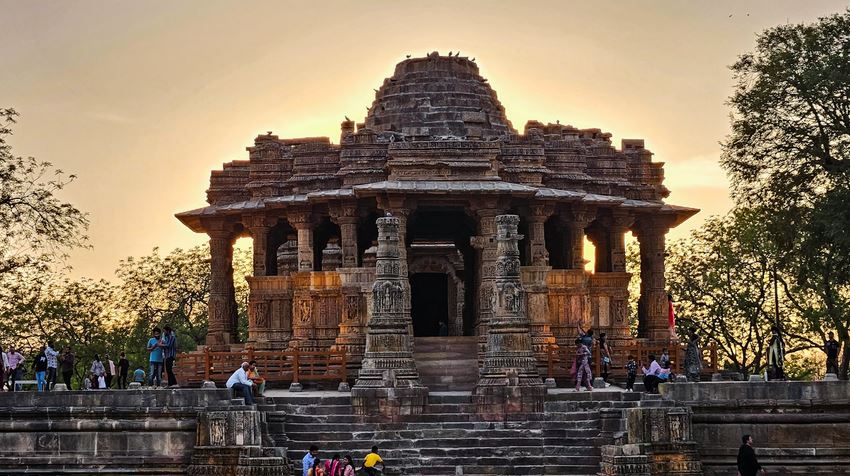Facts About Ancient India: A Timeless Civilization |

|
|
Photo by: Fenil Patel |
|
More Ancient Facts: Ancient India, a land of immense cultural and historical richness, is the birthplace of major religions and philosophies, and a pioneer in various scientific and mathematical fields. From the enigmatic Indus Valley Civilization to the golden age of the Gupta Empire, its legacy continues to shape the world. Here are 12 fascinating facts that offer a glimpse into this incredible past, followed by some frequently asked questions. The Indus Valley Civilization Was Highly AdvancedThe Indus Valley Civilization, flourishing around 2500 BCE, was remarkably advanced with well-planned cities, sophisticated drainage systems, and standardized weights and measures. The Vedas Are Ancient Sacred TextsThe Vedas, a collection of hymns, philosophical treatises, and rituals composed in Sanskrit, are among the oldest sacred texts and form the foundation of Hinduism and Indian culture. Yoga Has Ancient RootsYoga, a physical, mental, and spiritual practice, originated in ancient India thousands of years ago and continues to be widely practiced globally for its health benefits and philosophical depth. Ayurveda is an Ancient Medical SystemAyurveda, meaning "the science of life," is a traditional system of medicine that originated in ancient India and emphasizes holistic healing through diet, lifestyle, and herbal remedies. Ancient India Made Significant Mathematical DiscoveriesMathematicians in ancient India made crucial contributions, including the concept of zero, the decimal system, and early calculations of pi, as documented in historical works on Indian mathematics. Astronomy Flourished in Ancient IndiaAncient Indian astronomers made significant advancements in understanding celestial bodies, predicting eclipses, and developing sophisticated astronomical models, as evidenced in texts like the Surya Siddhanta. The Maurya Empire Was One of the Largest of Its TimeThe Maurya Empire (c. 322-185 BCE), founded by Chandragupta Maurya and expanded by Ashoka the Great, was one of the largest empires in the ancient world, known for its efficient administration and promotion of Buddhism. Buddhism Originated in Ancient IndiaBuddhism, founded by Siddhartha Gautama (the Buddha) in ancient India around the 6th century BCE, spread throughout Asia and has become a major world religion. The Gupta Empire is Considered a Golden AgeThe Gupta Empire (c. 320-550 CE) is often referred to as the "Golden Age of India" due to its significant advancements in science, mathematics, literature, and the arts. Sanskrit Was a Highly Developed LanguageSanskrit, an ancient Indo-Aryan language, was highly developed with a sophisticated grammar and rich literary tradition, serving as the language of scholarship and religious texts. Ancient India Had Impressive UniversitiesAncient India was home to renowned centers of learning, such as Nalanda and Taxila, which attracted scholars from across Asia and were hubs for diverse fields of study, as highlighted by historical accounts of ancient Indian education. Chess Originated in Ancient IndiaThe game of chess is believed to have originated in ancient India during the Gupta Empire, where it was known as Chaturanga, a strategy game with military elements. Ancient India FAQsA look at some more questions and answers when it comes to ancient India! What was the Indus Valley Civilization known for?The Indus Valley Civilization was known for its urban planning, including grid layouts and advanced drainage systems, as well as its standardized weights and measures and intricate seals. What are the major religions that originated in ancient India?Ancient India is the birthplace of several major world religions, including Hinduism, Buddhism, Jainism, and Sikhism, each with its unique philosophies and practices. What were some of the scientific contributions of ancient India?Ancient India made significant contributions to science, particularly in mathematics (including zero and the decimal system) and astronomy, as well as in the development of the medical system of Ayurveda. What was the significance of the Maurya and Gupta Empires?The Maurya Empire was notable for its unification of a large part of the Indian subcontinent and the spread of Buddhism under Ashoka. The Gupta Empire is celebrated for its flourishing of arts, sciences, and literature, often considered a golden age. Where can I learn more about ancient Indian history and culture?You can learn more about ancient Indian history and culture from reputable academic sources, museum websites like the Metropolitan Museum of Art (look for their South Asian collections), and educational websites focused on ancient history. |